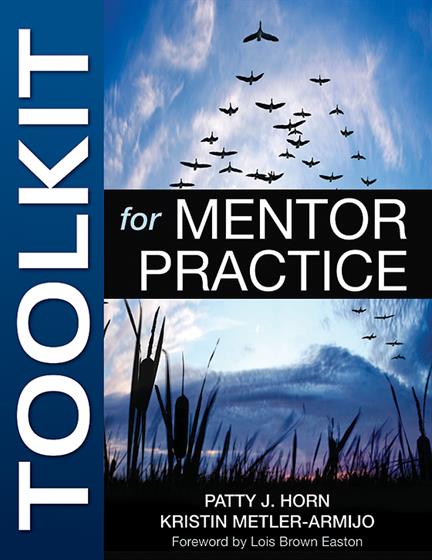List of Resources
Foreword
Acknowledgments
About the Authors
Introduction
Section I: Role Focused Transformational Learning Stage
1. Transforming Practice
Purpose for Transformational Learning Stages
Description of Transformational Learning Stages
Purpose for Managing Transformational Learning
Description of Managing Transformational Learning
Notes for Implementation
2. Conference Data Conference (CDC) Cycle
Purpose for the CDC Cycle
Description of the CDC Cycle
Notes for Implementation
3. Foundations for Mentoring
Purpose for Mentor Stances
Description of Mentor Stances
How to Use Mentor Stances
Mentor Stances in Action
Notes for Implementation
Purpose for Mentor Roles
Description of Mentor Roles
How to Use the Mentor Roles
Notes for Implementation
Purpose for Mentor Language
Description of Mentor Language
How to Use the Mentor Language: Questioning Prompts
Notes for Implementation
How to Use the Mentor Language: Paraphrasing Prompts
Notes for Implementation
How to Use the Mentor Language: Ways of Communication
Notes for Implementation
Notes for Implementing Foundations for Mentoring
4. Conference Data Conference (CDC) Journal Record
Purpose for the CDC Journal Record
Description of the CDC Journal Record
How to Use the CDC Journal Record During the Planning Conference
CDC Journal Record Tool in Action
How to Use the CDC Journal Record During the Reflective Conference
CDC Journal Record Tool in Action
Notes for Implementation
5. Beginning Conversations
Purpose for Tools for Building Trust
Description of Tools for Building Trust
How to Use the Tools for Building Trust
Purpose for Tools for Understanding Context
Description of Tools for Understanding Context
How to Use the Tools for Understanding Context
Beginning Conversations Tools in Action
Notes for Implementation
6. The Administrator and Mentor Conversations
Purpose for Administrator and Mentor Conversations
Description of the Administrator and Mentor Journal Record
How to Use the Administrator and Mentor Journal Record
Administrator and Mentor Journal Record Tool in Action
Notes for Implementation
7. Professional Teacher Growth Process
Purpose for Professional Teacher Growth Process
Description of the Professional Teacher Growth (PTG) Process
How to Use the Professional Teacher Growth Process Tools
Professional Teacher Growth Process Tools in Action
Notes for Implementation
8. Professional Mentor Growth Process
Purpose for the Professional Mentor Growth Process
Description of the Professional Mentor Growth (PMG) Process
How to Use the Professional Mentor Growth Process Tools
Professional Mentor Growth Process Tools in Action
Notes for Implementation
Section II: Practice Focused Transformational Learning Stage
9. Collecting Evidence: Teacher and Student Behaviors
Purpose for Collecting Evidence: Teacher and Student Behaviors
Description of Seating Charts
How to Use Seating Charts to Collect Data
Seating Chart Tools in Action
Notes for Implementation
10. Collecting Evidence: Teacher and Student Verbal Interaction
Purpose for Collecting Evidence: Teacher and Student Verbal Interaction
Description of Collecting Evidence: Teacher and Student Verbal Interaction
How to Use the Collecting Evidence: Teacher and Student Verbal Interaction Tools
Collecting Evidence: Teacher and Student Verbal Interaction Tools in Action
Notes for Implementation
11. Observing a Master Teacher
Purpose for Observing a Master Teacher
Descrption of Observing a Master Teacher
How to Use the Observing a Master Teacher Tools
Observing a Master Teacher Tools in Action
Notes for Implementation
12. Student Data Mapping
Purpose for Student Data Mapping
Description of Student Data Mapping
How to Use the Student Data Map Characteristics
How to Use Student Data Map Standardized Assessments
How to Use the Student Data Map Teacher-Created Assessment
Student Data Mapping Tools in Action
Notes for Implementation
13. Planning for Instruction
Purpose for the Instructional Planning Process
Description of the Instructional Planning Process
How to Use the Instructional Planning Process
Instructional Planning Process Tools in Action
Notes for Implementation
14. Lesson Design
Purpose for Lesson Design
Description of Lesson Design
How to Use the Lesson Design Tools
Lesson Design Tools in Action
Notes for Implementation
15. Videotaping as a Process for Reflection
Purpose for Videotaping as a Process
Description of Videotaping as a Process
How to Use the Videotaping Tools
Videotaping Tools in Action
Notes for Implementation
16. Collecting Evidence: Student Engagement
Purpose for Collecting Evidence: Student Engagement
Description of Collecting Evidence: Student Engagement
How to Use the Student Engagement Tools
Student Engagement Tools in Action
Notes for Implementation
17. Probing Higher Level Thinking
Purpose for Questioning Skills
Description of Questioning Skills
How to Use Questioning Skills
Purpose for Questioning Word Banks
Description of Questioning Word Banks
How to Use Questioning Word Banks
Probing Higher Level Thinking Tools in Action
Notes for Implementation
Section III: Learner Focused Transformational Learning Stage
18. Analyzing Student Work
Purpose for Analyzing Student Work
Description of Analyzing Student Work
How to Use the Analyzing Student Work Tools
Analyzing Student Work Tools in Action
Notes for Implementation
19. Planning for Differentiated Instruction
Purpose for Planning for Differentiated Instruction
Description of Planning for Differentiated Instruction
How to Use the Planning for Differentiated Instruction Tools
Planning for Differentiated Instruction Tools in Action
Notes for Implementation
20. Analyzing Student Assessments
Purpose for Analyzing Student Assessments
Description of Analyzing Student Assessments
How to Use the Analyzing Student Assessment Tools
Analyzing Student Assessment Tools in Action
Notes for Implementation
21. Planning for Differentiated Mentoring
Purpose for Differentiated Mentoring
Description of Differentiated Mentoring
How to Use the Differentiated Mentoring Tools
Differentiated Mentoring Tools in Action
Notes for Implementation
22. Reflecting on One's Practice
Purpose for Reflecting on One's Practice
Description of Reflecting on One's Practice
How to Use the Reflecting on One's Practice Tools
Reflecting on One's Practice Tools in Action
Notes for Implementation
Resources
References
Index




